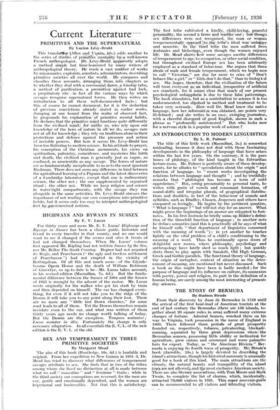The title of work (Macmillan, 5s-..) is somewhat misleading, because
it does not deal with those fascinating developments in the philosophy of language that have arisen within the last few years. On the contrary, it is the pure bones of philology, of the kind taught _in the ,Edwardian lecture-room. Mr. Palmer is perfectly aware of these develop- ments, for he alludes to " speculations about the origin " and function of language, to " recent works investigating the relations between language and thought " ; and he truthfully remarks that " philologist has become a term of mild opprobrium." But, owing presumably to personal taste, he writes with gusto of vowels and consonant formation, of sound-shifts and irregular plurals, of geographical distribu- tions and doublets, in fact of the behaviour of sounds and syllables, such as Bradley. Classen, Jespersen and others have
compared so loyinsly... He begins. perthienkquestion,
" What is language " willnot stay for an answer. What
might prove the beginnings of an answer are relegated to foot- notes. In his first footnote he briefly sums up Mililer's defini- tion of the threefold function of language ; in another' note he defines semantics (and this is practically all he says of what he himself calls " that department of linguistics concerned with the meaning of words ") ; in yet another he touches lightly on the vital problem of a child's conditioning to the meaning of a word. Thus he continually opens doors of delightful new rooms, where philosophy, psychology and anthropology have lately shed so much light ; but quickly shuts theta to play again with Sanskrit, Old High German. Greek and Gothic parallels. The functional theory of language, the origin of metaphor, context of situation as the deter- minant of meaning, are mentioned but never discussed. Such a book as this might have been is badly needed ; for the purpose of language and its influence on culture, its connexion with poetry, power and religion, its part in the definition of.a human being, are surely among the most interesting Of present- day sciences.














































 Previous page
Previous page